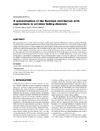Identificador persistente para citar o vincular este elemento:
https://accedacris.ulpgc.es/jspui/handle/10553/42935
| Título: | A generalisation of the Rayleigh distribution with applications in wireless fading channels | Autores/as: | Gómez Déniz, Emilio Gómez Déniz, Luis |
Clasificación UNESCO: | 1209 Estadística | Palabras clave: | Distribución Estadística |
Fecha de publicación: | 2013 | Editor/a: | 1530-8669 | Publicación seriada: | Wireless Communications and Mobile Computing | Resumen: | The signal received in a mobile radio environment exhibits rapid signal level fluctuations which are generally Rayleigh-distributed. These result from interference by multiple scattered radio paths between the base station and the mobile receptor. Fading-shadowing effects in wireless channels are usually modelled by means of the Rayleigh-Lognormal distribution (RL), which has a complicated integral form. The K-distribution (K) is similar to RL but it has a simpler form and its probability density function admits a closed form; however, due to the Bessel function, parameter estimates are not direct. Another possible approach is that of the Rayleigh-inverse Gaussian distribution (RIG). In this paper, an alternative is presented, a generalisation of the Rayleigh distribution which is simpler than the RL, K and RIG distributions, and thus more suitable for the analysis and design of contemporary wireless communication systems. Closed-form expressions for the bit error rate (BER) for differential phase-shift keying (DPSK) and minimum shift keying (MSK) modulations with the proposed distribution are obtained. Theoretical results based on statistically well-founded distance measurements validate the new distribution for the cases analysed. | URI: | https://accedacris.ulpgc.es/handle/10553/42935 | ISSN: | 1530-8669 | DOI: | 10.1002/wcm.1097 | Fuente: | Wireless Communications and Mobile Computing[ISSN 1530-8669],v. 13, p. 85-94 |
| Colección: | Artículos |
Citas SCOPUSTM
21
actualizado el 08-jun-2025
Citas de WEB OF SCIENCETM
Citations
17
actualizado el 15-feb-2026
Visitas
51
actualizado el 10-ene-2026
Descargas
244
actualizado el 10-ene-2026
Google ScholarTM
Verifica
Altmetric
Comparte
Exporta metadatos
Los elementos en ULPGC accedaCRIS están protegidos por derechos de autor con todos los derechos reservados, a menos que se indique lo contrario.
